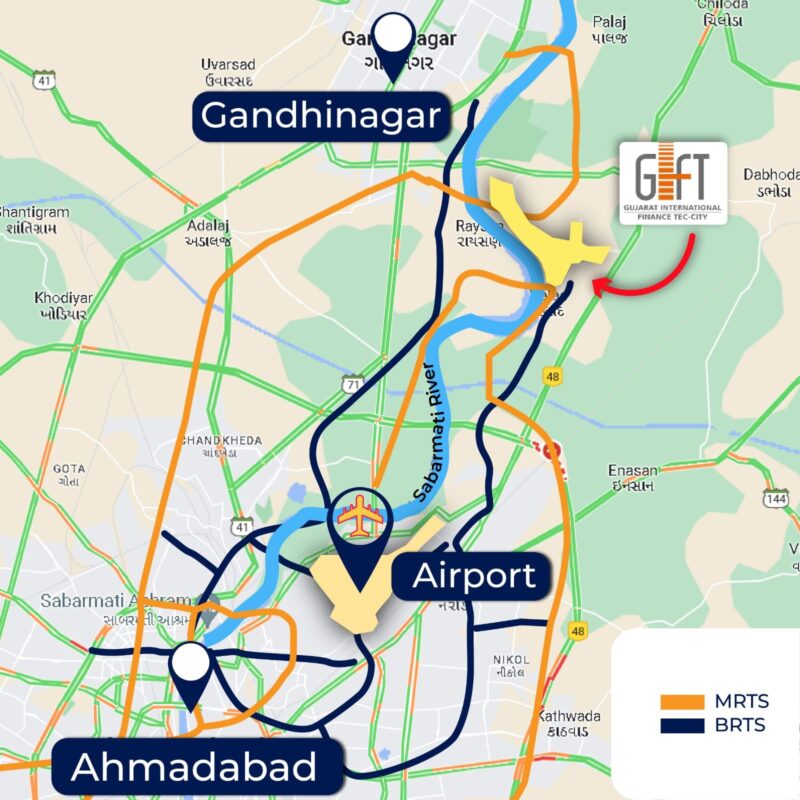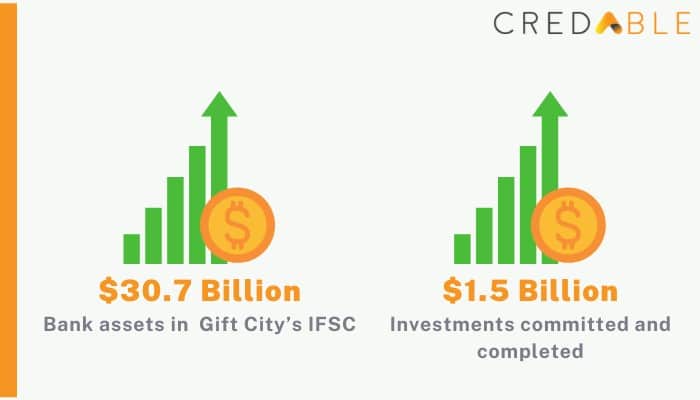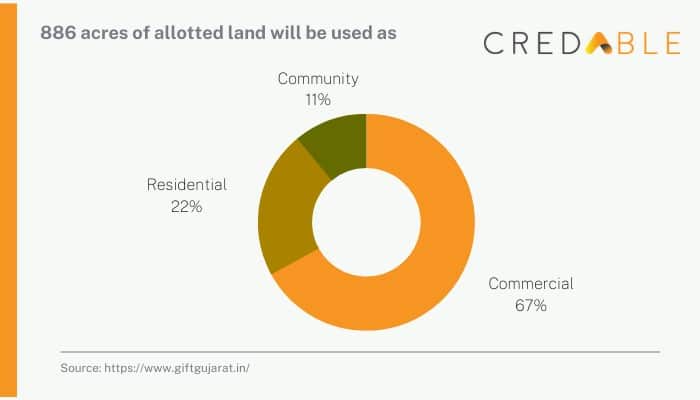Gujarat International Finance Tec-City: India’s Next Big City
Prime Minister Narendra Modi’s dynamic plan for 98 smart cities begins with an ambitious concept called the “Gujarat International Finance Tec-City” or GIFT city, with a budget of Rs 70,000 crore — the first smart city project in greenfields in India.
A greenfield project is one that lacks constraints imposed by prior work. The analogy is to that of construction on greenfield land where there is no need to work within the constraints of existing buildings or infrastructure.
GIFT is India’s first greenfield operational Smart City and an International Financial Services Centre, that is being promoted by Gujarat as a greenfield project.
Around seven km away from Gujarat’s capital Gandhinagar and about 12 kilometers away from Sardar Vallabhbhai Patel International Airport, along the banks of the Sabarmati River, in some 886 acres, what was once barren land alongside the river is now emerging as the country’s first integrated town in a greenfield setting, the kind of project PM Narendra Modi has envisioned while chief minister. His big plan, still a vague concept that involves high-quality connectivity and infrastructure, is starting to come into a form, which India hopes can serve as a template for the future of Indian cities. Transit-oriented development is adopted here, which is a type of community development that includes a mixture of housing, office, retail, and/or other amenities integrated into a walkable neighborhood and located within a half-mile of quality public transportation, along with providing 4 multilevel parking. Also, a modal split of 10:90 is targeted which means that 90 out of 10 people would use means of public transportation, reducing the overall carbon emission. Further, the city would be well connected with BRTS and MRTS.

GIFT is the most recent and ambitious project undertaken by the Centre and State governments, with a goal to establish a new financial center to compete with leading global financial capitals like New York, London, Hong Kong, and Singapore. Now operating with over 200 entities setting up offices, and employing over 12,000 people, GIFT City is the first and only international financial services center (IFSC) in India, where banks, stock exchanges, and financial services companies are setting up their global operations. The first big push for the project came through a Union Budget announcement in 2015-16, where the then finance minister, Arun Jaitley, said that regulations would be in place to launch India’s first international financial services center (IFSC) inside the GIFT City.
GIFT will attract not just foreign players, but Indian companies looking to do international business as well, increasing proximity between Indian and international businesses. GIFT seems an extremely compelling opportunity for India to establish a global financial footprint.
GIFT City is currently in the phase of ramping up, says Tapan Ray, Managing Director & Group Chief Executive Officer, GIFT City, and it is high time that GIFT City takes a major jump forward to become Asia’s next financial center. GIFT City is a planned commercial area being built between Gandhinagar and Ahmedabad, the two main business hubs in Gujarat.
OPS Fund Services, a Singapore-based subsidiary of Singapore-based OPS Global, received the license for setting up in GIFT Cities International Financial Services Centre. The license makes GIFT city a potential destination for private equity funds and VCs to set up offshore funds to invest in India. To attract greater investments and to ease major global players looking to establish operations in India, firms operating in GIFT City will enjoy special tax benefits and exclusions under the Foreign Exchange Management Act (FEMA).
GIFT is now being touted widely as the first Smart City of India – ostensibly the template for the 100 Smart Cities that are set to come up over the coming years. The central government wants to develop 100 smart cities all over India, in order to improve facilities and amenities in the urban areas. Existing cities such as Dholera and Surat in the state of Gujarat, as well as Visakhapatnam in the East, have already started working towards becoming smart cities, aided by companies like Microsoft Corp, IBM, and Cisco Systems.
India has not decided exactly what makes a city “smart,” but its current push is expected to involve building new centers, as well as retrofitting existing ones. No doubt, smart cities will also boost India’s economic growth prospects, increasing India’s standard of living. For starters, this is a city that will have intelligently planned transport and connectivity systems, efficient levels of infrastructure, that is, airports, highways, and roads, green and efficient power supplies, and finally, a better, digitalized data centres, fiber networks, Internet gateways, etc.
GIFT is conceptualized as a global financial and IT services hub, a first of its kind in India, designed to be at or above par with globally benchmarked financial centers such as Shinjuku, Tokyo, Lujiazui, Shanghai, La Defense, Paris, London Dockyards etc.

A birds-eye view from the top of one of two office buildings at the 886-acre GIFT project, the venture that began while Modi was Chief Minister of the State of Gujarat, shows few signs yet of Rs900 crore spent in Phase I. Phase II envisages development across a total area of 20 million square feet, with GIFT City expected to spend more than Rs 4000 crore in developing the infrastructure.
More than 20% of GIFT City is designated as a Greenbelt zone. A Greenbelt zone is an area particularly designated for natural open spaces such as public parks and gardens, where the construction of residences or factories is prohibited.

The working capital angle
The bank assets in The Gift City’s IFSC are worth $30.7 billion, and investments (both committed and completed) are worth around $1.5 billion (Rs11,000 crore) till 2021-22. Every bank transaction at IFSC is now a Swift transaction (Swift is the International Payment System). We are dealing with mainly foreign assets; if we are looking to place a portion of the international capital, then this is better done via the IFSC of Gift City. So, if the international banking units of State Banks in IFSC (IBUs) wanted to move the cash to Yes Banks IBUs, then it was not an instantaneous operation.

If investors from Singapore, Dubai, or Hong Kong are trading Indian securities and commodities from these jurisdictions, moving these operations to Gift City would be equally fiscally beneficial. For example, the majority of the staff at the NSE’s NSE IFSC Gift City affiliate is still based in Mumbai, whereas the SGX, an NSE IFSC affiliate, has taken up residence to record its presence at Gift City. The two Exchanges of Gift City, NSE IFSC and BSE affiliate India International Exchange (INX), are running moderate volumes, while two Exchanges in Gift City are running red. The global financial crisis in 2007-2008 did not help matters, with initial excitement among prospective investors diminishing. Only in December 2011 did Gift City get International Financial Services Center (IFSC) status, aiming to become a tax-free portal for India into the world of finance. After 2014, a preliminary framework for the GIFT IFSC was put in place, with regulations coming from the Reserve Bank of India, the Securities Exchange Board of India, and the Insurance Regulatory Authority of India (IRDA).
In Nov 2018, The Wire reported that Gujarat’s government will purchase 50% of the troubled Infrastructure Leasing and Financial Services (IL&FS) stake in GIFT City in order to minimize delays to the project. As part of its banking expansion plans across the country, Barclays Bank PLC has also set up a subsidiary, International Banking Unit (IBU), in Gujarat’s GIFT City in February 2021.
Investments In Gift City
Investment of Rs 11000 crore by 140 companies has been committed for GIFT City. Moreover, the average day-to-day trade in international currencies in GIFT City has crossed Rs 400 crore. The officials said that six aviation leasing companies were granted permits to operate out of GIFT City, with a further seven entities applying for permits. In addition, 30 alternative investment funds (AIFs) have lined up to join IFSC, while the International Bullion Exchange is expected to begin operations.
The current momentum of development at GIFT City
The number of entities at GIFT City has grown this year from 140 in 2019, and bank transactions have exceeded $125 billion by August 2021. Authorities are likely to approve the applications mentioned above, taking the total number to 283, according to sources familiar with the matter. The GIFT City has seen a 62% increase in entities setting up operations over the last year.
The Center announced an array of tax incentives for entities that set up international operations in the GIFT City. As a result, both BSE and NSE set up their international exchanges, 17 banks including 12 domestic banks and five international banks issued licenses for operations, over 100 brokerage services, depository clearance operations, and more than 19 companies started operations in non-life insurance. The IFSC-related measures by the Centre have included capital gains tax holidays for aircraft leasing companies, a tax holiday on lease fees paid by aircraft lessees abroad, a tax incentive to move foreign funds back into IFSCs, and an exclusion of the foreign banks investment arm.
It has received major impetus, with Deutsche, HSBC, Citigroup, as well as banks such as Bank of America, Standard Chartered, Barclays, and others setting up offices there, facilitating India’s growing trade and also the capital movements. Recently, Axis Bank sold its first additional Tier-1 offshore bonds at GIFT City.

As per plans, 886 acres would be allotted for development with almost 62 million square feet of development, consisting of 67% commercial, 22% residential, and 11% community. Moreover, the whole urban project has been divided into Multi-services Special Economic Zone (SEZ) covering 261 acres, and an Exclusive Domestic Tariff Area (DTA) covering 625 acres.
All this is to say that with an overall economic analysis and careful allocation of working capital, the future of this smart city sure looks promising!
Think Working Capital, Think CredAble!
